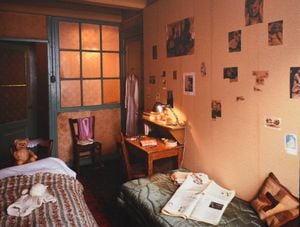Anne Frank's 'don't hate' legacy to Black Country students
It was an uncomfortable and often distressing experience. But students attending the launch of a new Anne Frank exhibition say they are better people because of it.

Teenagers took part in a performance at Walsall College to mark the beginning of the month-long exhibition.
The response of 14-year-old Ellen Potts, from Wednesfield, was typical.
The Heath Park pupil said: "I've always wanted to help the world but didn't know how to because I'm a young person and not very important but this project has helped me believe in myself and my role in society."
The pupils were inspired by another teenager, Anne Frank, whose diary famously charted her family's time in hiding from German Nazis in Amsterdam. The youngster, who died in Belsen concentration camp just weeks before it was liberated, remained idealistic about the world despite the atrocities that were happening around her.
The Heath Park students joined with pupils of Holly Hall Academy, Dudley, for the performance at Walsall College.
The pupils, who are ambassadors for the Anne Frank Trust, investigated discrimination 70 years ago and compared it with prejudice today.
The exhibition was launched on the 79th anniversary of Kristallnacht, or the Night of Broken Glass, which saw the organised destruction of Jewish businesses and homes in Munich, and attacks on Jewish men, women and children in 1938.
Mrs Libby Peers, assistant headteacher at Heath Park, which hosted the exhibition for two weeks in June last year, said the collaboration with Holly Hall led to them exploring two aspects of Anne Frank's story, with the Dudley school focusing on the wartime prejudices.
Pupils performed different characters, including Nazi perpetrators as well as their victims, some of them using personal testimony from the time. The project followed the launch of the students' own 'Educate, Don't Hate' campaign.
Heath Park pupils looked at 21st century discrimination, highlighting some less obvious forms of intolerance such as the boy who is bullied for being a goth and Ellen Potts' portrayal of a homeless person, all performed from students' own scripts.
Walsall mayor Marco Longhi welcomed the exhibition to the town, outlining the mix of cultures in his own extended family of Italian, Irish, Brazilian, Hungarian and Chinese. "So I feel very strongly about tolerance and how we champion it," he said.
Special guest was Holocaust survivor Mindu Hornick who was 13 years old when she was sent to Auschwitz with her mother, sister and two younger brothers. Now 88 and a grandmother, she lives in Birmingham and is dedicated to educating young people about the Holocaust.
She said: "I found it very difficult to speak about at first, I used to burst into tears and children would get very traumatised. So now I try to speak almost in the third person, detaching myself more. I still get very choked.
"But if I can tell my story and inspire just one young person to stand down from discrimination or bullying, I consider what I do a success. In order to move forward, we should never forget the past."
She will be telling her story a special event at Walsall College on December 6 as part of the month-long exhibition.
Also present was Ahmad Nawad, 16, who survived a Taliban attack on his school in Pakistan in 2014 when 130 fellow pupils died. Now living in Birmingham, he visits schools across the UK talking about his ordeal in the hope it will deter young people from being radicalised.
The exhibition looks at Anne Frank's childhood in Frankfurt and Amsterdam, with images of her family, their wartime registration cards, a replica of Anne's diary and photographs she had on her wall in hiding.
It also includes modern day victims of discrimination, including the stories of 'gentle giant' Jimmy Mizen, the 16-year-old schoolboy murdered in an unprovoked attack in a bakery in 2008, of Stephen Lawrence, 18, murdered in a racially motivated attack in 1993, and of Italian footballer Mario Balotelli who was racially abused during the Croatian match during Euro 2012.
The exhibition runs until December 6





